#even in relation with east asian queer media
Explore tagged Tumblr posts
Text
I would like to add two movies that i loved for the Indian Queer Media context (i am a tamilian queer brought up in UP, India) :-
Cobalt Blue (its based on a book by Sachin Kundalkar) - available on netflix (not sure if its there for international audience)
Geeli Puchi (its a great exploration on caste and queer identity in India - part of an anthology called Ajeeb Daastaans) - also netflix
I don't think i have links for the same or else would have added - you can search on google and find it! (you may also need VPN tho)
The Absence of India in Discussions on Queer Asian Media
So, yesterday @lurkingshan tagged me in an ask she got from @impala124 about the absence of India when we're talking about queer Asian media. I was intially just going to reblog it with my thought, but as it kept growing I figured it'd be best to just make my own post. Please read the ask linked above first so this makes sense.
*cracks knuckles* this is going to be the most fun I've had writing a post in ages. (For a little background, I'm a queer Indian, born and raised)
So, this is a very interesting question on a subject I've been rotating in my head for the past several months. There's a lot of different variables that contribute to the noticeable lack of discussion on Indian and South Asian queer media in general, so I'm just going to talk through the ones I've noticed a little randomly.
Talking about Asian media in general, it's well known that the mass popularity of kpop and anime has contributed massively to the increase in popularity of Asian media. If you've been in the Asian media fandom for any amount of time at all, you'll have noticed that media from Korea, Japan, and China gets by far the most attention from international audiences; all East Asian countries. There may be several reasons for this, but in particular, it's no secret that the fetishization of East Asians is a massive proponent in the popularity of media from these countries, while there's no such interest in South Asians. If we shift our focus to queer media specifically, media from these three countries is still extremely popular, with the addition of Thailand and the Philippines to some extent; both South East Asian countries. From what I've seen, there's very little international interest in media from South Asian countries (although, if we're talking about India specifically, I can't exactly say anything. Bollywood has not been good lately). If we talk about queer South Asian media, the scope of interest falls even further. If you'll notice, MyDramaList, one of the most commonly used websites for finding and tracking Asian shows only allows for East and South-East Asian shows. So, that's one reason—there's just not much international interest in Indian media in general. As Shan said in the initial post, it's partially because of a difference in priorities. Korea is notorious for using media to gain global standing, the role of the 'soft power' of Thai bls in the recent bills for equal marriage in Thailand has been widely discussed, the list goes on. Could racism also play a part in the massive gulf of interest in media from East Asian versus South Asian countries? Probably. But I'm not going to get into that too much.
Moving on, there's obviously a massive lack of queer media in India. I think this is greatly exacerbated by the fact that it's very hard to support the people making queer media beyond buying and/or streaming their work. The majority of people engaging with Indian queer media are queer Indians, and a lot of us have to do so in secret because of the society we live in. This means that creators that have to push through several obstacles to publish their work often receive little incentive to continue doing so because of the lack of engagement. Because of the lack of media, international fans are less likely to become interested in queer Indian media, and the cycle continues.
I will say though, contrary to what Shan said, I think Indian media, particularly anything that came out post 2019 might actually be on the easier end of the spectrum when it comes to access. This may simply be bias, so forgive me if I'm wrong here, but from what I've seen, a lot of queer Indian shows are in fact available on streaming sites, and at most you'd need a vpn to access them. I think the two main things that actually hold back queer Indian media from becoming more popular are a lack of noise and it's relatively lower quality.
The main way we find out about new shows in this space is through either word of mouth (well actually, post) or because we follow production houses known for producing media. Because of the sparse nature of both the media and the consumers, there's very few people who learn enough about the media to want to give it a shot. For example, there's a film on netflix called Badhaai Do (hindi for Congratulate Us) that I've been meaning to watch for a while. It centers around a lavender marriage and I've heard a lot of good things about it, so I was slightly surprised to see that most of the people on tumblr I interact with who have been engaging with queer media for far longer than me had never heard of it. There's also a, Indian BL from 2017 called Romil and Jugal that I've written about before here, and I would've never learned of it's existence if not for a friend hearing about it from another friend of hers.
Because there's so little queer indian media, it's natural that the quality leaves much to be desired. The main issue is, because the queer asian media market has become so saturated lately people are becoming a lot more selective with what they watch, and for good reason. This means that queer media from india is simply unable to grow and improve over time, leaving it stagnant. Back in 2016-2018, the overall dearth of queer media from Asia meant that a lot of people were willing to watch shows that were average or even worse. Thailand particularly seems to have benefitted from this, being able to grow and evolve its queer media due to the successes of shows like SOTUS, 2gehter, TharnType and more even recently, KinnPorsche. Queer Indian media will have a much, much harder time with this because of all of the factors I've talked about and more, meaning that it is much harder for queer media to evolve. Honestly, though I haven't been able to watch/read much queer media from India, the stuff I have seen is really quite decent, it's just that it tends to fail in comparison to some of the brilliant stuff we're seeing from other countries. A while a ago, I bought four queer books by Indian authors, and of the three I've read so far, I'd genuinely recommend two, albeit one with quite a few reservations (I'll be writing about them sometime in the future, just haven't found the time yet). While talking about this with @neuroticbookworm, she brought up the excellent point of how Indian media in general has just been of fairly poor quality lately. It seems to me that a lot of it is catered to more conservative audiences, which results in people like me becoming disillusioned with Indian media and simply moving onto things from other countries. It has been a long time since I've watched anything worthwhile come out of Bollywood. So, it becomes even harder for queer Indian shows to be found at all; a majority of their target audience has already forsaken Indian media as a lost cause.
So, those are a bunch of reasons because of which there's not a lot of discussion about queer Indian media in fandom spaces like Tumblr. Something else I'd like to point out is, it's very hard for queer shows in India to gain much traction whatsoever. Live television slots are ruled by the infamous Indian serials, the majority of the audience being people in their late thirties and older, particularly women. And while homophobia is just as prevalent amongst the youth of India as it is amongst older generations, younger people are far more likely to be engaging with queer media, in India at least. This means that it would be near impossible for queer shows to air on live television the way they do in countries like Thailand and Japan. The majority of Indian youth use global streaming services to watch shows, hence the greater concentration of queer shows on service platforms. (Romil and Jugal is something of a dark horse here—I don't believe it was ever aired, but it was produced by a producer who has a few decently popular serials under her belt and is available on an Indian steaming service—another reason I'm determined to research how tf this show ever came into existence) If we talk of movies, the industry is limited by the iron fist of Bollywood, another reason it's very hard for queer movies to be produced and why they're generally found on streaming sites.
There's just not a lot of people who have the balls it would take to make a queer Indian show/movie and push it to the Indian public beyond a streaming service. I mean, we're all seeing what's happening with the Love in The Big City drama right now, and believe me, public backlash in India would be the same, if not much worse. And if no one in India is watching these shows, why would anyone in any other part of the world? There's barely any public figures that would be willing to participate in such a project, so queer media stays underground. Currently, Karan Johar is the most popular—and one of the only—out celebrities in Bollywood, and, well, he's treated as something of a laughing stock by the public. He has one or two queer adjacent shows under his belt as a producer, but once again, they're barely known and available only on Netflix. There was a movie called Dostana in which he played a straight guy pretending to be gay but, well, that speaks for itself. And well, I can't exactly blame him for it, knowing how the Indian entertainment industry is.
To talk a little more about the specific comparison between India and Korea, I think you're fairly accurate in saying that the two countries seem to be roughly on par in terms of homophobia, although that's an extremely vague statement that's rather hard to either prove or disprove. While the difference in international attention towards Korean and Indian media is certainly a major component of the difference in discussion about the queer media from these countries, there's obviously other things that go into it as well. There's this video I watched some time ago on the progression of queer representation in K-dramas that's quite well researched. It's an hour and a half long, so in case you don't have the time to watch it (though I do recommend it), it basically talks about some of the dramas with queer rep that have aired on Korean television and their impact. While it's hard to gauge the level of impact of these shows on the availability of bls and gls in Korea, they certainly had an effect, if only telling the queer population of Korea that they are seen and heard. To my knowledge (although I may be mistaken), no such queer rep has ever aired on Indian television, meaning that there's nothing to push creators to put queer media out there. There have been old movies and shows that depict queerness, but none of them ever reached the sort of the scale where they may have some sort of impact on the industry. As I mentioned earlier, the widespread popularity of K-dramas (and k-pop) does make it easier for creators to make queer media since there's a much higher chance of the shows being successful thanks to the international audience. Bringing back Love In The Big City, the success of the book abroad and the high probability of the show being well received internationally is probably one of the reasons it was able to be produced amongst domestic backlash.
Now, I've been talking a lot about how it's difficult for queer Indian media to gain any sort of international recognition with domestic attention. However, it's not necessarily the case. Here's where I start rambling (I say, as if this post isn't verging on 2k words). It's been proven that the presence of the international market allows for greater creative freedom in spaces beyond television. The best example comes from Korea's very own 'soft power'; K-pop. There's a K-pop group called Dreamcatcher that debuted in 2017 with a rock sound and horror concept that was extremely rare in kpop at the time. They succeeded mainly by focusing most of their promotions to the foreign market, knowing that their concept would not be well liked in Korea. And they succeeded. Today, Dreamcatcher has a sizeable fandom and has even been growing in popularity in Korea, with the Korean public warming up to their genre and having influenced other girl groups to try out similar sounds. We've already talked about the lack of international attention for Indian media, but there's also the issue that the producers of queer Indian media aren't marketing to foreign audiences, which remain ignorant.
That's all I have, this is so long good lord. All in all, there's a bunch of factors that feed into each other creating a cycle which means that, unless there's a break somewhere, queer Indian media will remain unrecognized. I'm excited to see what other people have to say, because this is a topic close to my heart and I'd definitely enjoy seeing more discussions around it.
#indian queer media#indian ql#i love badhaai do#and margherita with a straw#i have not seen sheer qorma but its actually a great indian short film by faraz arif ansari#its a queer movie by a queer creator#there is a bunch of short films by other queer creators on youtube#i am not very aware on mainstream films as well and its sad 'cause it has so much potential#cobalt blue and geeli puchi have been my absolute favourite movies/short series since i never get to see stories like these anywhere#but i also think part of the reason why people have a market on queer films because there is a double hypocrite bias by society#people will palate a queer movie only when its on their terms#there was a huge backlash to fire (1996) because it was a lesbian storyline#and it did eventually lead to a mass protest by queer community at that time and ultimately led to nalsa judgement in 2012#but the fact that even though 2018 was the time homosexuality was decriminalised#the impact was so less w.r.t media#society still will watch other queer media from other countries but not support its own creators#and about mentioning queer films to other people around#people are still afraid to talk about it#even in relation with east asian queer media#i remember when kinn porsche was released#a lot of people watched it and the other person didnt know#most of it was watched by cishet women to see the actors in a “sexy” gaze (if someone understands it)#no one watches queer media if it is not for longing at the actors#which is also a problem with general catering of queer media to the audience#i hope there is some sense being made out of this because i feel i have lost the point i was trying to make
360 notes
·
View notes
Text
As a reader of both yaoi and danmei, what always bothers me is that danmei fans get REALLY mad when somebody calls them fujoshi, like fujoshi is some kind of nasty monster whose name we shall not pronounce.
But the fact is that... Danmei fans aren't that much different from fujoshi/fudanshi/fujin🤷♀️
Danmei was HUGELY inspired by early shounen-ai/yaoi manga back in the 70s, so pretending that danmei has NO relations to yaoi is like a child who has a sibling that they don't like and in public they pretend they aren't in any way related to their sibling, and they both are just strangers.
Danmei, despite later developing independently from yaoi, often has very popular and questionable tropes similar to yaoi, like:
1. gong-shou/seme-uke stereotypes (what I mean is even if gong and shou look equal and even have equal power positions, shou, more often that not, is portrayed as more illogical, immature, overemotional, embarrassed and even dependent on gong. While gong is usually portrayed as more mature, logical, stoic, independent and emotionally cold or at least knows how to hold his emotions in right time. There are only few authors like MXTX who try to subvert or to parody such stereotypes)
2. sexual consent issues
3. rape phantasy
4. shotacon
5. incest (be it biological or through adoption)
6. big age gaps
7. lack or absence of safe-sex practices
8. omegaverse
And what's funny is that many danmei fans, especially Western ones, act like danmei is "pure", "wholesome", "actual good gay representation", unlike "dirty", "too sexual" and "fetishistic" yaoi.
Okay, danmei is focused more on story and lore than on sex, but how does damn sex make something "dirty"? Sex is a natural thing that people of all sexualities do or don't do. Real life homosexual relationship isn't about unicorns and rainbows, not every gay encounter has to be deep (however it sounds). And many sexual scenes in danmei can be even more messy and atrocious than in yaoi, considering points I listed above.
Yaoi by its origin is "yama nashi, ochi nashi, imi nashi" (山[場]なし、落ちなし、意味なし) , which means "no climax, no point, no meaning". Yaoi wasn't supposed to be treated as serious or as "wholesome".And danmei wasn't supposed to be "god-honoring gay representation" either, because, as yaoi, the genre was made BY "mostly" straight women FOR "mostly" straight women. Even more, queer fans like me weren't a thing in Asian BL until late 90s, when East Asian media got more popularity abroad due to rapid developing and access of PCs and internet + more access to language translations.
So, attacking yaoi and fujoshi/fudanshi/fujin because they "romanticize shit" and "fetishize gays", while at the same time consuming genre that had similar origins, has similar problems and is still mostly written and consumed by straight cis women gooning at conventionally attractive guys banging each other - It's hypocrisy at best and stupidity at worst.
Either consume both genres, find good stories in each of them and be happy, or just don't be a fucking hypocrite.
And no, it's not "homophobic" or "misogynistic" or "anti" to give valid points about problems in BL/slash/yaoi/danmei communities, especially when you yourself consume and produce their content.
5 notes
·
View notes
Text

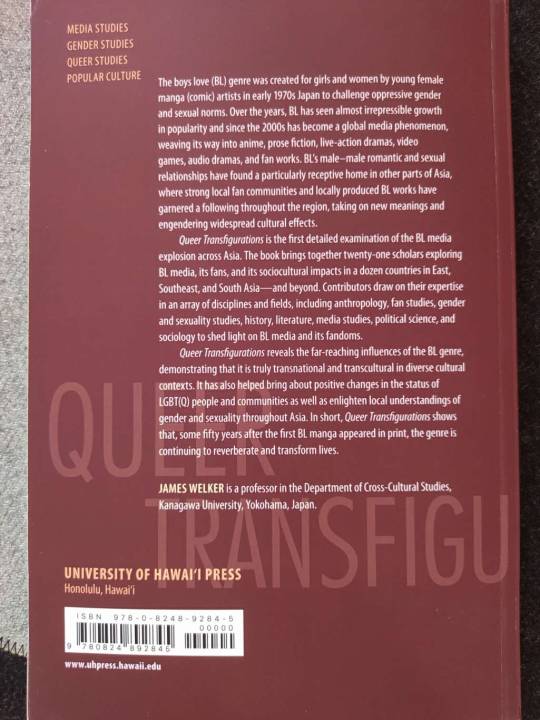
It's here! I'm enjoying myself a lot and thought I'd share some bits and pieces, again, starting with the introduction.
Introduction: Boys Love (BL) Media and Its Asian Transfigurations by James Welker, in: Welker (editor), Queer Transfigurations. Boys Love Media in Asia. Honolulu: University of Hawai'i Press, 2022. p. 1–16. [Jstor]
I took notes by hand while reading, tried to type them up as coherently as possible here.
BL is an umbrella term for all sorts of media (going by volume, the primary mode is still written – prose or manga) that depict male-male romantic and sexual relationships and are primarily marketed to young women. BL has had fans 'around the globe' since the 1980s, especially in East and Southeast Asia, though it really 'dramatically expanded in popularity in the current century'. (p. 1)
Asian BL fandoms do not exist in isolation from the rest of the world (p. 2)
queer as in a) gender/sexuality-related expressions that flout social norms, b) queering norms of (female) sexuality and c) creating breathing room for queer individuals (p. 2)
there's no clear line between BL and LGBTQ media (p. 2)
why 'transfiguration'? -> transit from one culture to another (p. 3)
BL: minor and often underground as a genre, still
4 overlapping attributes of BL and fandoms: 1) transnational + transcultural media phenomenon, 2) useful tool for unsettling gender and sexual norms, 3) cannot be separated from LGBTQ issues including politics, 4) BL is political (p. 4)
note on piracy of BL, its impact on Japanese producers, and how this is rarely discussed (*) (p-5)
1980s/1990s: BL makes it to Taiwan, Korea, China -> category blurring? (p. 5)
shipping as a part of BL fandom (p. 6)
legal issues in Malaysia, Indonesia, Singapore (p. 7)
shipping/fan works were a part of BL culture from the 1970s onwards (cf. Welker 2015) (p. 7)
seme/uke dynamics + shifts? -> mutability of gender (p. 8)
way of alternatives to masc stereotypes for cishet men (fudanshi) (p. 8)
blurring of gay and straight? (p. 8/9)
taboos around BL in Japan arise because it's often sexual and women engage with it (p. 9)
elsewhere in Asia: BL often serves as 'first conscious contact' for middle-class Indian and Indonesian fans with homosexuality -> may prompt reconsideration of own preconceptions/ideas/religious doctrine. (p. 9)
"representational appropriation" of images of gay men (cf. Ishida 2007) (p. 10)
fans turning activist for queer rights in Taiwan (p. 10/11)
rosy image of Japan among gay male fans of BL in mainland China (p. 10)
BL as progressive force for good (p. 10)
impact of US lawmaking on international fan communities (p. 10)
fan wars in South Korea (odeokku vs hujoshi) ca 2016; -> more recently: SK version of yaoi ronsou? (p. 11)
BL queer in that it flouts and facilitates the flouting of sexual and gender norms, has been pushing cishet fans to think about queer rights and the social standing of queer folks, sometimes even pushed fans to activism (p. 12)
grouping chapters under national/regional headings potentially misleading -> borders not so clear in the lives of fans and the texts they engage with (p. 13)
(*) I would LOVE to read more about this personally, anyone got anything? point me!
… this took entirely too long and I REALLY need to work on my handwriting, but I hope this might've been interesting to some. If you read this book (or anything else from the realm of BL scholarship), feel free to hmu, I'm an amateur but I love to talk this sort of stuff!
#acafandom#queer transfigurations#james welker#welker et al#bl history#bl academia#facets of bl#my nonsense#reading academic papers for fun not profit#hellsite (derogatory)#why do I even bother to try and format things nicely#guess at least they didn't kill my alt text for the images#if they had to rearrange them like it's 20-fucking-13
16 notes
·
View notes
Text
Ima link some articles below that might be behind a paywall so please dont use sci hub to unlock these articles, give shitty publishers your money
I talk with my friend about this all the time cos I've read works that cite yaoi and BLs as a subgenre of LGBT media, but what makes it so different from LGBT media that it requires a subgenre? Is it the view that the novels are written by seemingly straight women for seemingly straight women? Does that invalidate its queerness? Or does it make the content seem like if these characters were straight then the story would be exactly the same? Because of course that leads us to the criticism of queer stories that have a character's orientation as a plot point implying that only struggle makes a queer story. Even when we know that queer people enjoy BLs and yaoi. Cos for me, a lot of what is considered BL and yaoi feels very queer and I do consider it LGBT media.
What honestly caught my attention from (specifically) Thai BLs, yes the stories, but also the marketing strategies behind it. Perth recently made a video mentioning how gay marriage isn't legal in Thailand while talking about working in BLs. (Neither in Korea or Japan, but of course I would also have to read a lot more on queer activism in these countries) And how recent BLs have called out the discrimination, recognizing that they have an audience large enough that makes this activism worth it even if it turns away viewers that only watch BLs/yaoi without really supporting queer people.
How the character above says, it's basically the commodification of these actors and their relationship by showing that their ship chemistry transcends the show. Which to me was super different but also not cos yeah it's this insane hyperreal comprised of vague hints and fan service. But it's also like idol culture that thrives off the possibility that you can date your favorite idol. Instead, these actors are possibly dating each other.
For me, it��s very interesting how queer shows in different countries handle sexuality. Western queer shows are way more open and explicit with identity terminology. Eastern queer shows truly depend on the genre. (Tho obviously I’d be focused mostly on east Asia cos Southern Asia I’ve only seen one (1). And it’s badhaai do, which is Indian. Which also turned out to be relatively mainstream Bollywood according to reviews of Indian people en tumblr.) Cos sometimes these shows will absolutely use the word gay and lesbian and LGBT and trans, but also sometimes it's just implied. Or it's something completely nonchalant. Sometimes the characters will struggle with the fact that they like someone of the same gender, but they won't always use the exact words.
Watching My Love Mix Up (Japan), I really really related to the main character and how he handled being gay socially and with himself. But I don't thnk he ever quite used the word gay. Like, he started liking a guy and that was that. But also went through all the struggles of realizing this and how other people viewed him.
I have an article I want to read about trends in Asian Queer studies. I am currently reading an article that contextualizes the Thai BL industry along Thailand's monarchy and to quote: "Thailand’s heteropatriarchal social structure is “both subverted and reinforced” by what historian Ying-kit Chan (2021, 84) calls BL narratives of “moderated heteropatriarchy” that produce an opening for parental acceptance of same-sex relations predicated on the maintenance of filial piety." That's why they're all engineers and architects!!!
I love queer media and love analyzing and reading about queer media. And I love seeing different interpretations of queer media cos we've seen that even countries right next to each portray queer people so differently and use so many different visuals and literary devices to portray these relationships while also making them very personal to their culture.
I love talking about this cos there is so much to talk about and so much I want to read coming from a Caribbean context cos I haven't even deep dived in Latin American queer media just yet like. THERE IS SO MUCH!
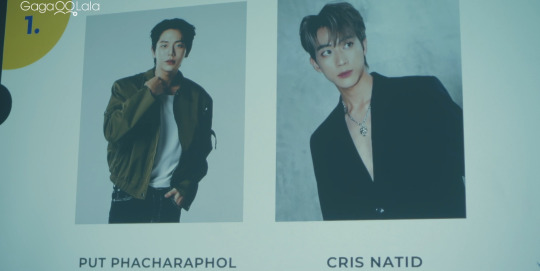

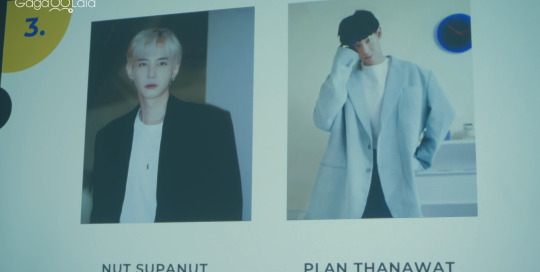
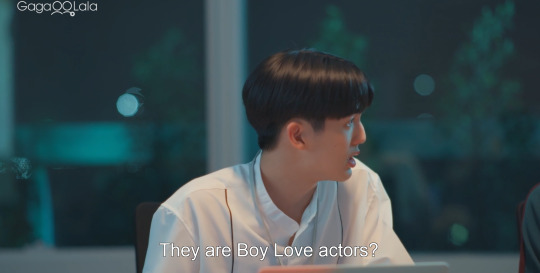

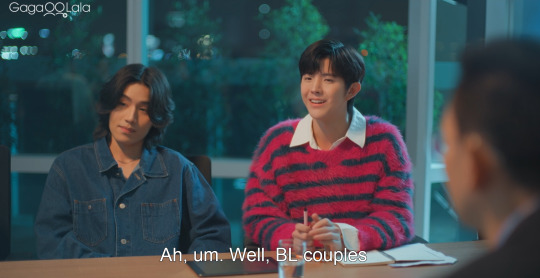
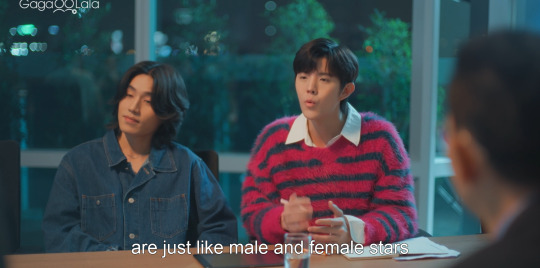
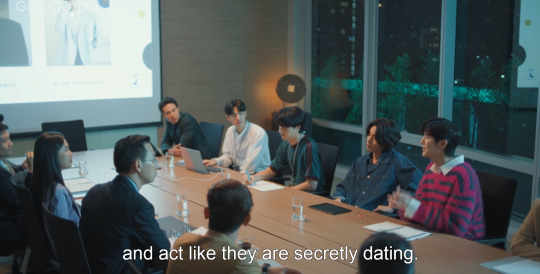
This is an entire conversation explaining the concept of shipping actors as well as using their status to sell products and about the use of the queer identity in their selling point is just... it's glorious because it's real but also because it's the discussion that happens so often with fans... what is the actor's job? Is it to sell a ship? Is it to act? What does it mean to cater to fans and when does it go too far?
(I am fascinated by them discussing this using some real stars and real acting pairs and it's honestly fascinating. @absolutebl I love this discussion happening in a show that isn't about actors in the industry but rather the industries adjacent and the discussions inherent in both the fanbase and the non-fans as well.)
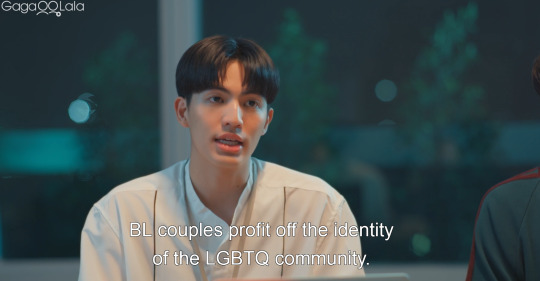
But also this line is even more fascinating because it does bring up the question... if his ex-boyfriend is a BL actor and thus part of the LGBTQ community is he exploiting his own identity? What about the writers, directors, producers and other actors who are also in the community? When does it stop being exploration and become another form of expression? Is there a line to be drawn? Or is there an inherent distinction between queer works and BL works that cannot be crossed as a line?
There's so much to breakdown and I absolutely cannot do it but it's such an interesting question to ask and a lot of interesting discussions that are possible from it.
#pixie rambles#i love love love theory and queer studies and academia#es que it's just so nuanced#wow#i love being queer
419 notes
·
View notes
Note
if you’ve addressed this before I apologize but what do you think of claims that Kevin is a poc coded character and his supposed “mistreatment” is fandom racism?
I mean Nora definitely intended for Kevin to be white while writing him, as she did with all other characters who races are not stated as otherwise. And like, I think I’ve seen the post you're talking about and what they describe is not what coding actually means.* There also isn't any textual basis for Kevin to be a POC besides Wymack, who people often see as non-white due to the discomfort over his 90’s tribal tattoos. IDC if people HC Kevin as a POC, but usually he’s just vaguely tan in the way people make Neil. You’ll see a “The Rock” FC for Wymack, but I haven't seen anything that actually goes beyond that. I’ve seen fic’s actively treat Dan, Matt, and Renee racistly, but Neil and Kevin get the same “vaguely tan” treatment and therefore avoid it. Nicky and Riko are different since they're canonly POC and not fanonly, so they fall into a different area.
I would also say Kevin is a pretty common fandom favorite too? So I would disagree with that claim as well. Most people I talk to their favorite is either Andrew or Kevin it seems, then like a few Aaron lovers, and my personal favorite is Neil. These are all canonly white main characters–and are largely still depicted and treated as such. Dan, Matt, Nicky, and Renee are all larger characters than Jean or Jeremy, and besides Nicky, are intended to be white but the fandom decided weren't. So Dan, Matt and Renee all get pushed to the sidelines over favorable ‘white’ characters. Fandom’s racism actually has such wild layers tbh, same with its misogyny, but that’s another thing.
I do think with a lot of the characters in AFTG adding headcanons making them POC can add an entire new layer to the canon and recontextualize scenes and struggles which would make some themes a lot stronger–I do this with most of the foxes in fact.
But Kevin to me, if I do HC him as a POC, he is going to be white-passing and raised essentially believing he is white until he learns otherwise.
Kevin to me is very peak white guy. I love him as a character, but book 1 he shows very typical white guy arrogance. He comes to a team and bosses them around while also dismissing them in the same breath. He believes he is owed something from the people around him, and they will blindly follow him and do what he says. They should always listen to him, and he automatically knows what is best–better than Dan. This feeling of “what I ask will be given, and I am above them” is definitely due to the raven mentality of everyone is inferior, but I’m sure there were racist raven recruits along the way, and Kevin is usually HC to be brown and not East Asian/Japanese, which experiences a very different type of racism. I believe if Kevin was a brown MOC… he would act differently.
Personally, I see white-passing Kevin discovering he’s not actually white as much more narratively interesting and fitting. His mom is Irish, and it's very rare for a mixed kid to be perceived by society to look more related to their white parent than their brown parent–unless of course they're white-passing. And since the fandom usually has Wymack be a MOC, then it would make sense for this green-eyed light skin baby that never is outside but when he is he just kinda tans but is still light skinned, and think “yeah I believe her when she said he’s not my kid.” I also think it could fit Kevin’s arc of realizing Exy isn't all there is to him, in fact there is a whole culture and a father waiting for him to connect with, that he didn’t even know was there ‘as an option.’ it gives him something else to tack onto his identity as well that he had no idea about and was sheltered from.
I’m still not solid on my own HC for Wymack and Kevin and if he will be white-passing or just white yet, but I play around with the idea sometimes for sure. But I don’t ever see him as visibly a POC. He feels no need to prove himself like Thea does and the media is shown to go easier on him as well as the foxes. The foxes are annoyed with him, but they ignore it, and the media forgives him easily and fawns over him, telling him he’s handsome and talented. Kevin from an outside perspective is very privileged in a way that parallels with Allison a lot actually. Who was based off of Paris Hilton– disowned wild child of a rich family that owns Hilton hotels, struggled with the public eye and is credited as the original influencer.
*But yeah POC coding isn’t really a term like queer-coding is. Queerness is something that must be unstated for various reasons, which led to coding for either vilification or because there was no other way for it to be shown. But media dives pretty hard into ‘othering’ with POC, doing it’s best to show all the ways whiteness is different from ‘the rest’ by playing up stereotypes or extra emphasis on non-white features. I mean the first ever ‘talkie’ or modern day movie, had blackface in it, (the jazz singer). There is no perceived societal need for ‘POC coding’. There is such thing as ‘Jew coding’ however, which again is used for vilification and dates back pretty far in depictions of devils in churches in Europe. Kevin isn't shown as a ‘gay pervert’ like queer-coding does, or ‘dark curly hair and a strong nose, with his hands rubbing together’ like Jew-coding does. POC aren’t treated with coding but rather a full dive into minstrel depictions instead.
Kevin is shown as sympathetic but also struggling, he is a victim, but he is also harsh. He is struggling with addiction that gets enabled by the other people around him who don’t know a better way to help. He has an arc, he learns to grow, he gets the tattoo, he talks to Wymack, he fights with Dan, he speaks to Jean, he scores the last point on the winning game, he learns to stand up to Riko. He develops in the books, and is one of the 3 main characters, Neil, Andrew, and Kevin.
I think the fandom definitely focuses mostly on Andrew and Neil, which is unsurprising since they're the main pairing and get the most development and attention by the author as well. But the nature of fandom and fanfiction typically is to have all the background characters act as overly invested props to get the main paring ending up together. That's just kinda the way fanfiction typically goes. Kevin still largely is a character with his own thing going on, often recovery or dating other people or grumbling in the background with his own thoughts, in fics a lot more than any of the other characters in AFTG who aren't Andrew and Neil. I don’t think Kevin gets excessively ‘mistreated’ either, I think he gets a lot of the similar flattening out of his character we see a lot in general in fandom, whether its for a joke post or a fic.
#ask#anti semitism tw#racism tw#homophobia tw#Stereotyping tw#mailob#fandom culture#fandom psychology
24 notes
·
View notes
Text
How We Fall Apart by Katie Zhao - Review

7.6/10
TWs: inappropriate student/teacher relationship, abuse, suicide, self harm, parental neglect, panic attacks, drug use, racism
(I ranked the TWs in order of severity)
Hi! This is my first tumblr post, so I should probably introduce myself- I’m Jaanu, and I read (probably way too much). This is a “blog” account where I’m going to give my reviews on different books as I finish them. At the moment, I’m only reading books by BIPOC and queer folks(though this may change) it will be what I focus on: so needless to say, this is a safe space. I want to highlight books with representation because they were so few and far between growing up, and I know I’m not the only one looking for these kinds of books. I’ll do my best to give spoiler-free reviews, so I hope you enjoy!
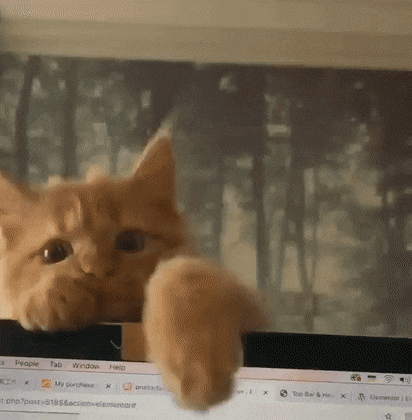
The summary:
“Nancy Luo is shocked when her former best friend, Jamie Ruan, top ranked junior at Sinclair Prep, goes missing, and then is found dead. Nancy is even more shocked when word starts to spread that she and her friends--Krystal, Akil, and Alexander--are the prime suspects, thanks to "The Proctor," someone anonymously incriminating them via the school's social media app.
They all used to be Jamie's closest friends, and she knew each of their deepest, darkest secrets. Now, somehow The Proctor knows them, too. The four must uncover the true killer before The Proctor exposes more than they can bear and costs them more than they can afford, like Nancy's full scholarship. Soon, Nancy suspects that her friends may be keeping secrets from her, too.
TL;DR Students at an elite prep school are forced to confront their secrets when their ex-best friend turns up dead.
I first found this book through a tik tok video, and the author marketed it as Asian dark academia; normally when I hear this, it’s safe to assume people are talking about East Asians, but I commented to ask and found out that one of the four main characters is South Asian, Akil Patel. That was how HWFA made it onto my TBR and eventually my bookshelf. (I’m South Indian, and a sucker for dark academia).
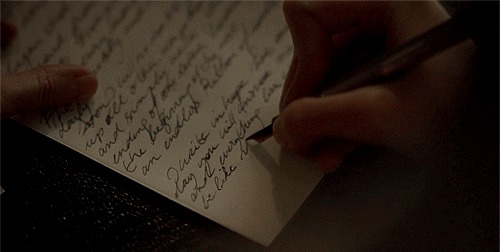
In terms of representation, the book has good parts and less good parts. The MC, Nancy, is Chinese-American and many elements of her culture are seen throughout. This is probably bc the author is also Chinese, so she’s writing what she knows. As for the other characters… not so much.
We see that Alexander can speak Mandarin, so he’s most likely Chinese, but Krystal is just stated to be Korean and there’s nothing really involving her culture. Same with Akil. I was kinda disappointed that Akil and Nishant (the other minor South Asian character) were only recognizable as such by their names, but I digress.
What I liked:
Okay I loved the dynamic between a certain someone 👀 and Nancy - I felt like they were able to say a lot without saying a lot, and I really liked how the book avoided typical potholes in the diverse YA path: the rep that was there, was good rep. I also love highschool cliches, and I liked how they were struggling through regular classes like AP World History or AP Chem - I found this really relatable.
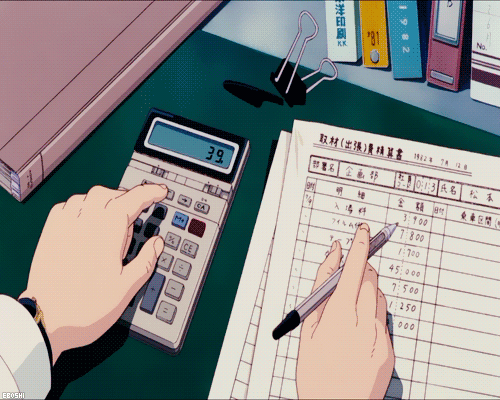
Also, at the beginning of each chapter there would be a sample comment from the messaging app “Tip Tap” and those always made me laugh, because the language was so realistic to the way people in my generation actually text. I genuinely liked the story- I never got bored, never had to put the book down because I was lost, I was able to pretty much finish it in a day.
There are also at least two queer characters (one bisexual, the other undefined) which made me really happy because it was subtle, unexpected, and added a layer of character depth.
I like the way that HWFA didn’t outline a clear villain, and in the end you realize that these are all just high schoolers who don’t actually know what they want and that’s okay! It tackles mental health in a very raw way, which is why I say: take the TWs seriously!!
Last thing, the relationship between Nancy and her mother made me cry - her unquestioning support of her daughter while also wanting her to excel really hit home for me. This book is a love letter to diaspora kids trying to make their parents proud, even at the expense of their mind and body.

Here’s why I can’t give it a 10:
I read Ace of Spades first. I know that sounds like a terrible reason, but hear me out. Ace of Spades (still no spoilers) follows a similar plot line almost down to the letter, except the main characters are Black and it’s a lot more terrifying than “dark academia”. If HWFA is like Asian Gossip Girl, then AoS is Jordan Peele’s “Get Out”. Both books are really good, both have scary anonymous texters exposing the main characters to the whole school, both take place in very privileged private school settings and are centered around secrets coming to light. I’m not saying anyone copied anyone else, they both came out the same year, but reading AoS first meant I could see the ending long before it showed up in HWFA.
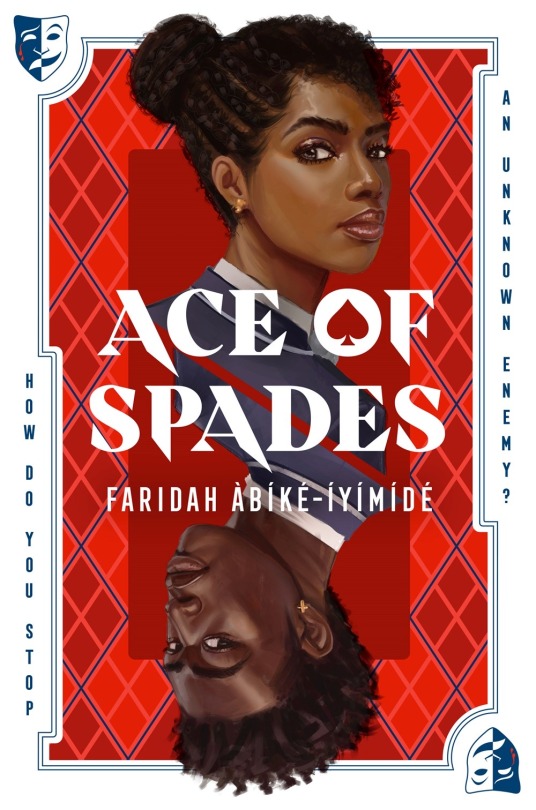
Also, and this is a big one, I couldn’t stand Nancy.
I tried over and over again to relate to her, to excuse her actions, and I understand she’s not meant to be a perfect person but she kept making these really really dumb choices, like super dumb, and the reasoning was always “I’ve never been allowed to step a toe out of line, I want to be bad for once” etc etc.
I can’t explain how many times I wanted to jump into the book and shake her, because there are levels to dumb, especially as a teenager. Drinking? Okay, kinda dumb, but you’re 18, whatever. Inappropriate student/teacher relationship? Different. Level. I wish it had been made more clear in the trigger warnings how central this would be to the plot.
On that note, I didn’t like how the book never really addressed why the student/teacher relationship was inappropriate - it was more so because he was a bad person than because he was older and totally taking advantage of her.

That being said, dark academia is one of my favorite genres, and HWFA did it perfectly. We have the tension, the secret meetings, the academic stress, the nighttime danger, the plot, the mystery. This is Katie Zhao’s first “older” YA novel, with characters in high school instead of middle school, and I say overall it was a job well done 💯!
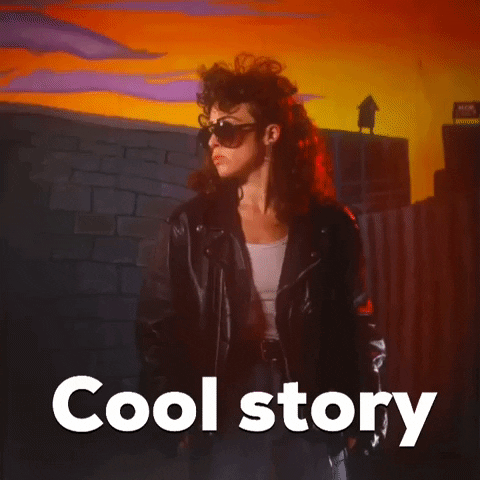
#book review#booklr#how we fall apart#katie zhao#dark academia books#readers of tumblr#book talk#poc books#queer bipoc
6 notes
·
View notes
Text
Not incredibly relevant to anything regarding mental health, but I find it interesting watching some western folks talk about gender-related things pertaining to east asian media, esp anime/manga.
A lot of the language used in western spheres, particularly English, doesn't directly translate to East Asian cultures/languages. The lines between being a gender nonconforming cis person vs being a trans person are blurry at best. Similarly to how the word "queer" in it's usage in American English is vague while also being distinctly not-cishet, there are a lot of terms and cultures where there aren't lines drawn between gender nonconformity and trans-ness, and it's odd to watch people only familiar with American culture try to put labels on people or phenomena in East Asian cultures that simply doesn't apply. (This happened a lot in Elliot Page's Gaycation, which I strongly disliked TBH. He was very judgemental about folks in Japan not really categorizing themselves similarly to Americans. Which isn't to say Gaycation (or Elliot) is bad rly, just maybe not the best in terms of objective and culturally sensitive examination)
Don't rly know the point of me posting it other than to ramble. I definitely think learning more about East Asian/Korean queer culture helps me examine my own gender, because I personally don't draw lines in my own identity between what is gender nonconformity vs transness (particularly transgender-ness) in myself, even so far as to say I consider things like my facial piercings to be similar weight and significance to me and my gender expression as my binder, or even my surgery. I'm simply trans, and that's all people need to know. Gender is a performance, as they say, and I'm just in the costume department.
8 notes
·
View notes
Text
5 Contemporary Book Recommendations with WLW relationships!
As promised, this is my list of 5 book recs with FF centered relationships! They’re in no particular order and I hope it’ll motivate you to read some good queer works of art!
1. The Seven Husbands of Evelyn Hugo by Taylor Jenkins Reid Link to book: https://www.goodreads.com/book/show/32620332-the-seven-husbands-of-evelyn-hugo
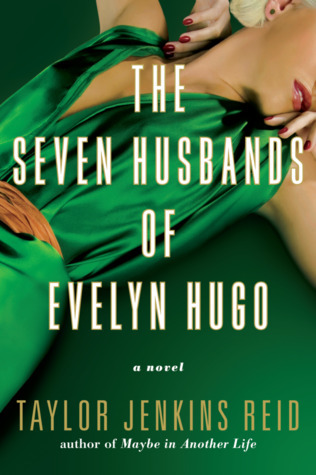
Synopsis: Aging and reclusive Hollywood movie icon Evelyn Hugo is finally ready to tell the truth about her glamorous and scandalous life. When she chooses unknown magazine reporter Monique Grant for the job, no one in the journalism community is more astounded than Monique herself. Why her? Why now? Monique is not exactly on top of the world. Her husband, David, has left her, and her career has stagnated. Regardless of why Evelyn has chosen her to write her biography, Monique is determined to use this opportunity to jumpstart her career. Summoned to Evelyn’s Upper East Side apartment, Monique listens as Evelyn unfurls her story: from making her way to Los Angeles in the 1950s to her decision to leave show business in the late 80s, and, of course, the seven husbands along the way. As Evelyn’s life unfolds—revealing a ruthless ambition, an unexpected friendship, and a great forbidden love—Monique begins to feel a very a real connection to the actress. But as Evelyn’s story catches up with the present, it becomes clear that her life intersects with Monique’s own in tragic and irreversible ways. --> I read this a few months ago and I remembered myself just putting my Kindle down onto the bed and looked into my imaginary camera man’s face thinking about the ending. I loved everything about this book, the friendship, the romance and the style of writing tied them up nicely. Also, apparently there’s going to be a TV series coming soon in the future so yes I’m 110% confident I’ll be crying with a bag of chips at the end too ;’) Seriously though, do yourself a favor and read this! 2. The Falling in Love Montage by Ciara Smyth Link to book: https://www.goodreads.com/book/show/53066661-the-falling-in-love-montage
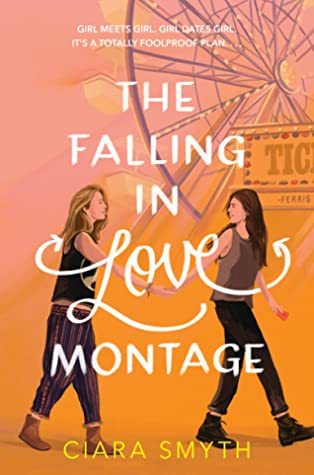
Synopsis: Saoirse doesn’t believe in love at first sight or happy endings. If they were real, her mother would still be able to remember her name and not in a care home with early onset dementia. A condition that Saoirse may one day turn out to have inherited. So she’s not looking for a relationship. She doesn’t see the point in igniting any romantic sparks if she’s bound to burn out. But after a chance encounter at an end-of-term house party, Saoirse is about to break her own rules. For a girl with one blue freckle, an irresistible sense of mischief, and a passion for rom-coms. Unbothered by Saoirse’s no-relationships rulebook, Ruby proposes a loophole: They don’t need true love to have one summer of fun, complete with every cliché, rom-com montage-worthy date they can dream up—and a binding agreement to end their romance come fall. It would be the perfect plan, if they weren’t forgetting one thing about the Falling in Love Montage: when it’s over, the characters actually fall in love… for real. --> The Falling in Love Montage is one of favorite FF books because I couldn’t not relate myself with the main character, Saoirse. I loved her humor throughout the book. She came off a little strong at first and it did seem like she was annoying but there’s a reason why she’s so sarcastic and cynical and I loved that the book wasn’t all 100% about the romance (although that is one of the best parts of it). I binged this within two days and I was fairly satisfied at the end and I can’t not recommend this enough for those who want to read a happy queer romance book! ALSO I LOVE THE COVER SO MUCH 3. The Weight of the Stars by K. Ancrum Link to book: https://www.goodreads.com/book/show/36952571-the-weight-of-the-stars

Synopsis: Ryann Bird dreams of traveling across the stars. But a career in space isn’t an option for a girl who lives in a trailer park on the wrong side of town. So Ryann becomes her circumstances and settles for acting out and skipping school to hang out with her delinquent friends. One day she meets Alexandria: a furious loner who spurns Ryann’s offer of friendship. After a horrific accident leaves Alexandria with a broken arm, the two misfits are brought together despite themselves—and Ryann learns her secret: Alexandria’s mother is an astronaut who volunteered for a one-way trip to the edge of the solar system. Every night without fail, Alexandria waits to catch radio signals from her mother. And its up to Ryann to lift her onto the roof day after day until the silence between them grows into friendship, and eventually something more . . . In K. Ancrum’s signature poetic style, this slow-burn romance will have you savoring every page. --> The Weight of The Stars is mostly a quiet read, and when they say slow-burn, they really mean it. I loved this one a lot even thought it’s mostly a character-driven type of book. This is sort of an enemies-to-lovers type of book, though it went fairly quickly from enemies to friends. This book feels like something you should read slowly, just to savor it all and process everything on the pages. 4. Her Name in The Sky by Kelly Quindlen Link to book: https://www.goodreads.com/book/show/20886492-her-name-in-the-sky
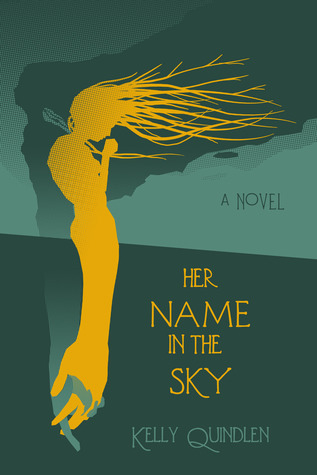
Synopsis: Hannah wants to spend her senior year of high school going to football games and Mardi Gras parties with her tight-knit group of friends. The last thing she wants is to fall in love with a girl--especially when that girl is her best friend, Baker. Hannah knows she should like Wally, the kind, earnest boy who asks her to prom. She should cheer on her friend Clay when he asks Baker to be his girlfriend. She should follow the rules of her conservative Louisiana community--the rules that have been ingrained in her since she was a child. But Hannah longs to be with Baker, who cooks macaroni and cheese with Hannah late at night, who believes in the magic of books as much as Hannah does, and who challenges Hannah to be the best version of herself. And Baker might want to be with Hannah, too--if both girls can embrace that world-shaking, yet wondrous, possibility. --> Her Name in The Sky is a beautiful coming age story between two girls in a conservative town. I did find this one slightly harder to read because I usually stray away from books like these but I think it’s good to pick something up like this from time to time. Don’t be scared away though because this has a good and happy ending to it. 5. Something to Talk About by Meryl Wilsner Link to book: https://www.goodreads.com/book/show/52915426-something-to-talk-about
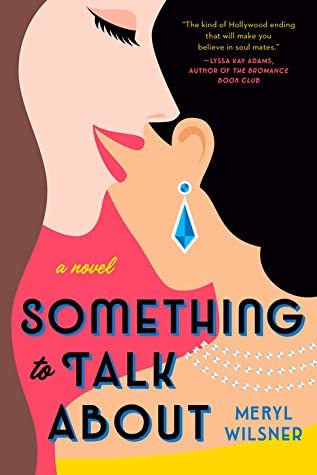
Synopsis: A showrunner and her assistant give the world something to talk about when they accidentally fuel a ridiculous rumor in this debut romance. Hollywood powerhouse Jo is photographed making her assistant Emma laugh on the red carpet, and just like that, the tabloids declare them a couple. The so-called scandal couldn't come at a worse time--threatening Emma's promotion and Jo's new movie. As the gossip spreads, it starts to affect all areas of their lives. Paparazzi are following them outside the office, coworkers are treating them differently, and a "source" is feeding information to the media. But their only comment is "no comment". With the launch of Jo's film project fast approaching, the two women begin to spend even more time together, getting along famously. Emma seems to have a sixth sense for knowing what Jo needs. And Jo, known for being aloof and outwardly cold, opens up to Emma in a way neither of them expects. They begin to realize the rumor might not be so off base after all...but is acting on the spark between them worth fanning the gossip flames? --> Another queer rom-com heading your way with this final rec! This was a fun and cute read about the romance between Jo, who is a Chinese Hollywood star and her assistant, Emma. I read this in a book slump and I loved it, its sort of a fake-dating trope like book and I’ve never read something like this outside of fanfiction so it was an enjoyable experience all the way! Also, when the author described Jo at one of the red carpets with her dress with pockets, my mind automatically imagined Gemma Chan from Crazy Rich Asians as her.
#september 2020#book recommendations#queer fiction#wlw#lgbtq#sapphic books#pride 2020#the seven husbands of evelyn hugo#taylor jenkins reid#the falling in love montage#ciara symth#romantic comedies#historical fiction#contemporary#fiction#literature#the weight of the stars#k. ancrum#science fiction#romance#poc characters#poc authors#female authors#her name in the sky#kelly quindlen#religion#christianity#something to talk about#meryl wilsner#fake dating trope
79 notes
·
View notes
Text
Probably literally no one wants to read this, but on the off chance anyone wants to CHOOSE to read my thoughts on fanworks in relation to traditional western culture and not merely be subjected to them via DM during an innocent (though angsty as all hell) convo on the parallels between Stucky and Destiel well, here’s 1700 words on it:
—-
Actually. And here’s the thing that works so damn well with both bucky/Steve and Dean/Cas is that there is no clear “damsel/hero” dichotomy that we see in classic heteronormative relationships.
But like.
The thing about fan fiction, and AO3 specifically, is that it primarily features homoerotic and homoromatic relationships between two cisgender white men. Yes that is changing- mostly thanks to the rise of KPOP (the surprise lord and savior of 2020) and Hulu and Netflix optioning East Asian movies and television series to spread those narratives. Which is an entire thing on its own because so many of those like- is it Untamed? Feature homosocial environments and thus- the point is. The landscape is changing and yay.
But AO3s success is largely predicated on two main ships: Stucky and Destiel. Yes there are others that are huge and continue to grow, but these are the two that I feel (with no data or research to support my assertion) helped AO3 take precedence over ffnet as THE site for fan work hosting.
Now, the contradictory thing about fan work, the thing that is so often described as hypocritical and/or fetishizing is that the majority feature two cisgender white men engaged in homoerotic and/or homoromantic relationships when the majority of the readers and creators of fan works are neither.
Data supports the supposition that most fan work creators and consumers identify as non-male. And in that subset the majority identify as female.
Simply based on generic population data, the correlation can be made (again no effort put into googling this because I have sewing to do) that the majority of this group is likely cisgendered heterosexual (white) women.
However, fan works and fan engagement are a proven community for fans who do not ascribe to the heteronormative gender binary or heterosexual and/or heteroromantic relationship structure and are, in fact, not just white. Again- imagine numbers that are factual because sewing.
Fandom is not unique to entertainment media. We can trace it back to, well, as long as we can trace it back. What are the Venus of Willendorf statues of not fanart? The Parthenon? Egyptian funereal pyramids and their contents? Renaissance art in general? Is the King James Bible not a “fix it” for the previously canonical literature (that’s a hot take don’t come for me.) (you could also consider the King James Version an attempt at song fic).
In more contemporary culture, we have sports fandoms- primarily male dominated. Primarily cisgendered heterosexual white male dominated.
The fandom culture of sports fans has been described as that of collectors and curators- they want memorabilia and statistics and gatekeeping actions often require proof of knowledge or commitment via possessions.
Meanwhile, entertainment media fandoms- such as those experiences on AO3- are more creative than curatorial. Instead of efforts to organize, delineate and create hierarchies within fandoms (yes this happens but is not the overriding force), these sorts of fandoms seek to create fanWORKS and fanCOMMUNITIES. Yes, fantasy sports leagues exist and so do sports teams fan communities. But I ask you, where in sports fandoms is there a GISH?Or an AO3?
The reality of contemporary western dominated culture (entertainment,sports,economic,political, artistic and philosophical) is one that features white cisgendered heterosexual men at the apex-
Both as creators and consumers despite prevailing realities in population and cultural zeitgeist.
As such, most western dominated fandoms are homosocial: dominated by one group, that of white cisgendered heterosexual men.
All that is to say, most star athletes are straight white dudes. Most movie stars are straight white dudes. Most politicians. Most wealth holders and distributors. Most creators.
Why? Because patriarchy. But the WHY isn’t the point of this long ass word vomit.
It’s the So What?
Sports fandoms are the territory of these same homosocial networks.
But media fandoms are the territory of those NOT at the top of that hierarchy.
While the CONTENT and the original content creators remain part of that homosocial white cisgendered heterosexual group, the consumers of media are largely NOT OF THAT GROUP despite what the content creators may desire or believe (see: the creatives behind supernatural and their ridiculous ability to convince themselves that their core demographic are straight white dudes 15-40).
As such, content that features the patriarchy is primarily heterosexual, heteronormative, racist (acutely or passively), misogynistic, homophobic, homosocial and, well, lacking.
Take, for example, MCU and Supernatural as franchises. Our main characters are primarily white dudes. White dudes who mostly interact with other white dudes, whose “tribes” (brethren, compatriots, coworkers) are also white dudes. Yes, smurfs exist- the token woman or non-white person. Sometimes even a queer person (gender or sexual, though very, very rarely gender queer).
The fact that whenever our “heroes” interact with anyone outside their tribe or homosocial group they are almost inevitably evil, dead or about to die is telling. How many women die in supernatural? How many people of color? How many villains in the MCU (and while the X-MEN franchise isn’t necessarily within the MCU because Hollywood, the queer coding within X-MEN is encyclopedic) are queer coded?
Now, I’ve said repeatedly that heterosexual and heteronormative relationships are the mean within such media. Our white dudes bang white ladies, love white ladies, but act like manly white men and don’t put romantic feelings ahead of things like patriotism and pain unless they have “earned” the right to such (a trial that often involves a lot of deaths that are never addressed or given recourse. See:endgame)
Bros before hoes is more or less the rule of western mainstream media.
As such, relationships that demonstrate respect, trust, vulnerability, compassion and resiliency are almost always homosocial: or they are between two bros (no homo) and not between a man and a woman.
You trust the guy at your back, not the woman because you 1. Want to bang her 2. She’s probably going to die 3. She’s a damsel 4. Seriously she’s probably going to die.
Which all means: most of the well developed characters and relationships within mainstream western media are homosocial- they exist between two members of the same group. In our case, those straight white bros (which of course within supernatural can sometimes be taken literally in the case of Wincest).
Which means, the consumers of this media- mostly not white straight cisgendered dudes- are left with content that doesn’t represent who they are or what they want or even can aspire to.
So what’s the solution? Collect data and memorabilia? Sure why not.
OR: use your beloved media, those well developed characters and relationships, to create something new.
Fan work.
We circle back, at last, to the idea that fan work creators and consumers can be hypocritical or contradictory by creating works that feature that which they are not- these white dudes in love (romantic, sexual) with each other.
This supposition suggests that creators and consumers are using the characters and situations in fan work as replacements for what they lack in heterosocial relationships- either in media or in their own lives. Or, put another way, fans replace either Bucky or Steve with themselves and image the other to be their “love” interest.
To an extent, this may be true. That both parties are usually written to have male genitalia while most fans do not is where so many of the hypocritical and fetishization issues come into play.
But the reality is, fans are working with what they are given. Most fans don’t have dicks. A generous portion of fans don’t want to engage with dicks is sexual ways (or engage in sex at all) (and it must be emphasized that the majority of works on AO3 are rated T not E).
But the value in reimagining, subtextualizing, or deconstructing the mostly platonically presented homosocial relationships in western media as homosexual or homoerotic or homoromantic is not (for the most part) about fetish or about placeholders and substitutions for the fan.
It is about creating fanwork that reflects the society a fan lives in or wishes to live in.
Just as the sports fan will go to a bar and paint themselves blue and deride the Yankees because they want to envision a society that upholds a white cisgendered male patriarchy, media fanWORKS are created because we do NOT have a society that values romantic or erotic relationships between equals (for in traditional western society the only equal to a white cisgendered man is another white dude).
So, at last, a return to Stucky and Destiel.
The relationships created in fanWORKS between these two aren’t simply those where one is the “‘man” in the relationship and the other is the “woman”.
Yes those fanWORKS exist.
But most utilize the strong bonds of trust and respect and vulnerability and dare I say shared experience to create romantic and erotic relationships that are both more complex and more realistic than those actually portrayed in the same media.
In Stucky, we see Steve save Bucky and Bucky save Steve. We see Bucky hurt Steve and Steve hurt Bucky. We see their positions as EQUALS as a means by which to create a world where fulfilling relationships can exist that do not automatically restrict one (or more) parties to that of “chattel”.
The same is true of Destiel.
And both relationships feature key similarities within the original media that make for such rich possibilities.
Castiel saves Dean from hell. Castiel is brainwashed by the patriarchy to view Dean as lesser and even to kill him (this happens multiple times).
While Steve saves Bucky from Azzano, it is Bucky who saved Steve for almost their entire lives before that point. And after that point the two go back and forth to save each other. And let us not forget that Bucky was ordered to kill Steve but “he knew me”.
Dean and Castiel go through a similar ping pong match of saving each other.
This isn’t just about being equal in strength- it’s about being equal in vulnerability.
Which, to belabor the point, doesn’t exist in mainstream media’s romantic or erotic relationships nor is it widely taught or reinforced in western culture as a whole.
In conclusion.
Stucky and Destiel can save the world.
But probably KPOP would do it better and faster and cooler.
—-
Totally feel free to engage with your own opinions. Because I have to go sew now but later? Later we should talk friends and foes.
#fandom#meta#critical#fanfiction#fanfic#fanart#mcu#supernatural#SPN#stucky#destiel#Steve Rogers#captain america#bucky barnes#winter soldier#dean winchester#castiel#deancas
22 notes
·
View notes
Note
Hi it’s the person “making assumptions”. Not making assumptions, but when I see someone being praised for using a condescending tone in relation to something that I, as a black woman, care deeply about I take issue. Didn’t say people were right to send hate, but his response was poor and misjudged. Just making my judgment off the behaviour I see as we all do. I do expect better from a white guy with power who demeans the legitimate concerns of those who were asking for more politely. Be kinder.
Hi anon, while I appreciate an important discourse, I am surprised that you’ve come to my blog when I see that the same message you seem to have copied and pasted into multiple asks in the skam tag and have gotten support for your claims. just so there’s no confusion, I’ve copied you entire message to Chris below. I’m also kind of riled up today so this will probably be stupidly long.
_Not true, when people with approx 400 followers post links on social media for protests it usually generates 3 more signatures. Imagine if someone like Maxence, with 500k followers, posted a link to a petition. His silence is privilege, his silence is choosing the side of the oppressor. He stands for no one but the white man if he can’t do the bare minimum. Coming from a black girl who works in charity, and knows first hand the impact that social media can have on protesting. Don’t make excuses.
(2) I’m just real tired of white people excusing themselves with “I was learning” (axel) when the black community don’t have a CHOICE. This is our reality, and you’re either with us or against us. Silence means you’ve chosen the side of the oppressor, to paraphrase Desmond Tutu. Not aiming this just at you, but all Skam fans defending their behaviour. It is bad. Don’t excuse white men for being lazy and ignorant.
(3) Maxence wants to scold people for not going to a protest? His tone is condescending, and shows more of his privilege and ignorance. Oftentimes it’s unsafe for PoC and queer people to go to protests. His safety is guaranteed, he’s a straight white man. The whole point of BLM is to fight for the safety of the black community globally, including France which is racist as fuck (Burka ban?!), so for a white guy to not realise why some people don’t go to protests is just ignorance. Educate him.
(4) it’s not shifting responsibility btw. People are allowed, especially minorities, to ask for white people to do their bit. People with large influence should do better, especially if their career is made on a show that supposedly address social problems through TV (mental health, islamophobia, homophobia etc.) you really can’t sit there and scold people for asking for better. Sometimes the language and approach is poor, but the point is often correct. Please think before you defend them.
no one is excusing maxence, especially when he did exactly what you asked: posted a link to a petition for all of his followers to see. that’s not silence. I’m east-asian and I have a masters degree in media studies and communication. while I agree social media can be a great tool, I would argue that posting on it is more of a ‘bare minimum’ than anything else; without anything actionable (petition signing, donating, self-educating, voting) then it’s just virtual signalling. it’s not concrete. since maxence was literally at a protest tonight, he seems to be on the right track with his support. he’s not against you.
the systemic and historical roots of racism around the world are awful. no one denies that, including in france. canada in particular is no exception. I agree that the pasty men of the world have more work to do. but to deny them the time and opportunity to educate themselves seems counterproductive. I’m not sure what sort of timeline you have that everyone must meet, but it takes a long time to learn new things, and longer to unlearn everything you thought you understood about an issue or yourself. I literally have cerebral palsy and I knew so little about disability studies and activism prior to taking a class on it. am I a bad cripple? I didn’t start coming out as bi till last year and don’t do much activism there yet either. am I lazy and ignorant?
more precisely, how are you or I supposed to dismantle racism or oppression without their help? in my opinion, your tone here is equally if not more condescending towards them, and chris. quite frankly, if I were maxence I would’ve probably said something very similar. I don’t know how it feels to be inundated with strangers telling you what to do, and how to feel, and how much of an asshole you were being because of something as ridiculous as instagram posts.
I’m a former teacher of junior high and high school. that’s not education. it’s being a dick because the internet protects you from real repercussion. the person axel replied to wasn’t asking, they were demanding and being rude as hell about it. you’re free to dislike his or maxence’s tone as you will, anon. but you are assuming that maxence doesn’t understand why people may not attend protests. he’s not an idiot; all of s5 of skam fr was dedicated to disability awareness and representation. he literally plays a queer, mentally ill character. pretty sure he has basic human decency and knows not everyone can go marching into physical danger. to call him ignorant because he’s not writing an academic essay in his stories about the struggles of every minority group is a bit of a reach and frankly just mean. you also seem to assume he’s not done anything else because...what? he didn’t post about it?
I also have to disagree with the idea that “sometimes the language and approach is poor, but the point is often correct.” you’re not going to get anyone onside by belittling and insulting them. that’s just a fact. just as you didn’t draw chris onside, you’d never bring maxence if he wasn’t already here, protesting. if you allow all these people on his socials that grace of a poor approach, why do you not give it to maxence in his response? because he’s right. copy/pastes and hashtags are not enough. there is more work to do and everyone’s capable of it. I truly respect your position and I empathize deeply with the enormous struggles that you and your community face daily. you’re free to expect whatever of maxence, but it doesn’t mean you’ll get it. he does not have to document and prove his allyship to anyone. if you’re unhappy with it, then I’d suggest stop following him or blocking his name. venting your anger at other people doesn’t affect him.
your anger at him in general doesn’t really affect me either, despite this essay. you ordering me to do or feel things doesn’t seem kind. but I’ll never have the same stake in this fight as you do, so it’s not up to me to tell you what to do or how to feel. you came into my inbox expecting a response, so here’s mine. I hope that this renewed rage and energy around the world is the turning point of all of this. I’m sorry you even had to send any of these asks in the first place.
#anonymous#a wild ask appears!#skam france#maxence danet fauvel#my eyes hurt lol today was just....so much#skam fr#guys I don't know how the read more ended up IN THE ASK I'M SORRY.
27 notes
·
View notes
Text
Rai@Tired | raikamudapon
[link] Tbh the discourse around the term "fujoshi" is just motivated by shaming women for their interests and sexuality, and specifically trying to seem woke by taking Japanese fan girls down a peg.
Yalls need to stop with that orientalism and colonizer attitudes.
[link] Ok so, One of the biggest differences of how I see Japanese people digesting media and how Americans digest media is the ability to separate oneself from the topic.
Japanese people are used to living with duality. The culture of Japan is all about honne and tatemae, and while a lot of Americans think of tatemae as situational lying, it's a specific form of communication that adds a buffer of space between people. Sometimes that buffer is helpful and sometimes it isn't but that's not what we're discussing today.
In the same vein, Japanese fans consume media with that buffer space, and you see the difference in fandom spaces very keenly. For example, Japanese cosplayers don't tend to roleplay. I feel like the community discourages it, especially in public spaces because the idea is that you are not acting as a character or placing yourself in the character, you are borrowing a character to temporarily express yourself. In america you see encouragement of becoming the character and more closely associating with them in a way you don't really see in Japan. With cosplay, a lot of original outfits with characters isn't as widely accepted, and people are encouraged to add warning tags to heavily modified designs or non-cannon outfits. There's often a buffer between self expression and character expression, and Japanese people in general tend to have a clearer cut between fiction and reality. Americans go the opposite direction, and put themselves personally in to their fandoms. Any criticism or portrayal of a character isn't about the character, it's about *them*.
Bl for many fujyoshi is a way to explore various topics about sex and gender, and have that safety barrier of "this is fiction that has nothing to do with reality". Theres even a famous phrase in bl circles of Japan, which is "BL is fantasy." People arent consuming bl content because they want to it be realistic. With this genre, a lot of American's first exposure to this culture is through groups that carry these Japanese ideas, especially that fiction is not about reality. There's a strong culture in fujyo circles in Japan to keep fujyo media hidden from from minors and uninterested people.
This isn't because gay adjacent media is shameful and should be hidden, but because aside from keeping 18+ content away from minors, the content is inherently not for the benefit of non-fujyoshi, or people looking for canon content. Bl is a fantasy exploration of pre-established media, an additional step away from reality. And you see this influence in american bl fans as well. Most responsible adults discourage 18 under people from interacting with 18+ content. It is going to be much rarer for 18+ bl content to be presented to minors with no prior warning then for het media or media that explicitly sexually objectifies women.
And I think in conversations about this topic is where you see not just misogyny and sexual policing of woman come in, but a lot of conversations and ideas revolve around how "gross" and "strange" and "foreign compared to woke Americans" the entire culture of fujyoshi is.
Trying to insist that Americans determine what definitions of language around a culture not originating or centered in America and sentiments about bl are "appropriate" is colonizing attitudes. It stems from the belief that the cultural values of the colonizer are inherently superior to another country. And treating the norms of a foreign sub-culture that was not only established in Japan but continues to flourish and be the center of media produced by that subculture as gross or strange is honestly tinged with Orientalism of the "sexual far east". It's hard to say that the image that all fujyoshi are women does not influence these ideas as well.
So let's delve in to relations between Japan and America for a hot second. Japan and America have a very unique relationship, especially for countries that are separated by the biggest ocean in the world. Without examining the entire history of the two countries, I want to focus on two points that I think shape the way Americans interact with Japanese media. First, America with it's "black ships" was the one to end Japan's Sakoku policy. They forcefully demanded Japan end it's strict regulations concerning interaction with other countries, start trading with various countries, and to open up to western influences.
This *greatly* changed the structure of Japan, and honestly the unequal treaties and inability of the Tokugawa shogunate to manage their relations with the west lead to the end of 264 years of governance. (The Meiji restoration is exciting, please read about it.)
The second topic you don't see many people discuss is the occupation of Japan by American(and English) forces from 1945–1952. While a lot of modernization and things that benefited common people occurred during this time, there was also wide spread instances of violence and rape. You still see generational hurt and mistrust in places like Okinawa, Sasebo, and Yokosuka where American navy bases were placed(and still exist today). If you can stomach it, I would recommend looking up statistics and reports, but I warn you the occupation was nasty business for women.
So what does this all have to do with modern fujyoshi? So in both of these time periods, prostitutes and courtesans were an essential part of political interactions. Many Americans gained their stereotypes about Japanese women through these encounters. Specifically these interactions were sexual or tinged with the sexual availability of these women, and looking at the increased rapes during the occupation once American GI focused brothels were abolished, you can see how this lens shaped Americans opinions of Japanese women. The story of madame butterfly is only unusual in that it gives the woman in it any agency in their interaction with american men.
So with this in mind, I think it's easy to see where a lot of stereotypes, specifically sexual stereotypes about Japan and Japanese women come from. America is used to looking at Japan as "the weird strange place of loose morals and loose women of strange sexual proclivities." This is shown how strong the influence of Japanese women as "geisha girls" is to this day, and it tints any conversation of about women and sexuality in Japan.
In modern day, you can see this carry over in to how people look at Japanese idols and women in anime. I would even say that it's evolved to infantilize Japanese women and the view of how Japanese women are expected to behave. A lot of other people have written literature and reading about fujyoshi and how it relates to the sexual liberation of women(without necessarily involving men or gay men) so I won't go in to that here, but there will be links at the end of the thread.
What I want to talk about is how historically America is used to putting itself front and center about any topic about the culture of Japan, and how the views Americans have about morality is considered to be "better" and more "woke"... even without context or how those sentiments shape the ideas of foreign people and foreign based media. But we also have to address how Americans have a huge problem with not being the expert voice in any conversation.
Over the last week, a significant number of Americans have been extremely comfortable in putting the power to decide what Japanese words mean and what Japanese sub-cultures are in their own hands, sometimes even attempting to remove my Japanese voice and background from me in an effort to center their own opinions. And honestly this isn't anything new. Americans are so comfortable with thinking of Asian voices as less influential then their own, that it doesn't stop people from thinking they are the experts about a topic that *does not come from their culture*. You see it with food, you see it with fashion, you see it with everything from equating Asians to *white lite* to assuming that Asians don't exist as mixed people but simply as a monolith.
There are so many people who were comfortable with placing themselves as experts in a sub-culture of Japanese origin that they knew nothing about, simply because they assumed it corresponded with one aspect of themselves. And it is hard to say that the confidence that these people placed themselves and their ignorance in the middle of the topic did not stem from Americans feeling of ownership over everything they enjoy.
The people supporting these people may have thought they were being good allies by blindly supporting them, but I saw very few people bothering to further their knowledge past the loose collection of stereotypes and horror stories I saw from the internet. Some of these feelings of superiority probably stem from the fact that these people assumed that all fujyoshi or bl content consumers are women. Misogyny isn't just the expression of hate towards women, but also the idea that non-women inherently have a more valuable opinion then woman, or that women's ideas are inherently less valuable then anyone elses.
I saw a lot of misogyny this week, both internal and external. There was hate from many people, for the idea that people they assumed women were thriving in a sub-culture that does not involve real gay men. I saw people who could not imagine that men were not at the center of a subculture created and supported by both women and queer people. I even saw examples of women bringing up their experiences as a gender they do not identify with in order to raise their voice against other assumed women. But the voices that attempted to de-legitimize assumed women grew even louder once they were speaking against Asian people, because there is an inherent assumption that their views are qualified, their opinions more valid, their morals better.
And honestly, this isn't just an issue with white and eurocentrific supremacy, this is an issue of American supremacy.
And that is certainly something we need to talk about.
link: thread by @futekiya
link: thread by @dionysiaca
link: thread by @raikamudapon
please consider donating to @raikamudapon’s ko-fi
[reformatting mine]
330 notes
·
View notes
Text
saw a 15 year old lesbian comment on reddit that “most” lesbians realize they are gay earlier than 15.... LOL.
For what it’s worth, I really hope that most gay and bi femmes are realizing who they are attracted to earlier than I did: hopefully, the prevailing culture is less toxic/homophobic/biphobic, there are more accessible resources to learn about diverse sexuality, there’s more representation in the media.
But I also think a lot of us "older" folx ended up repressing/ not recognizing our attraction to women until somewhat later in life than 15.
I didn't actually realize that until I was attracted to women until 23/24. I was just starting to question a bit at 20, but I wasn’t sure about it until a few years after that. I’ve only ever had sex with one woman, one time. A majority of my life past the age of consent (which was 16 in my state) has been spent in a monogamous sexual relationship of some sort with a cis-het man- and being the Type of Person who is in that kind of relationship really enforced this sense of being A Straight Type of Person. That, along with a whole truckload of internalized biphobia (You’re not a Real Bi if you’ve never been in a relationship with a woman! You’re not a Real Bi, because Bi Women Do Not Exist- you’re Clearly A Poser Who Gets The Attention Of Men By Pretending To Be Interested In Women, Even If You’ve Told Zero People You’re Interested In Women! You’re Obviously Going Through A Phase. You Can’t Be A Bi Woman While Being In A Relationship With a Cis Het Guy). I still struggle with that sometimes, being in an open/ poly relationship with a cis guy is different, and I’m dating women and NB folx, but the persistent, shitty, biphobic question is still there, bouncing around- can you actually be a real WLW if you have any ongoing sexual or romantic relationship with a man?
I think part of the reason it took so long for me to figure out what attractions I have was that there was no WLW frame of reference for the first ~18 years of my life. In high school, there were no "out" lesbians, bi people, NBs, or transpeople; only one very flamboyant gay dude (who was bullied by pretty much everyone), and one very not-flamboyant but not closeted gay teacher (who was bullied by the administration, by students, and by homophobic parents). There was certainly no sex ed to speak of (yeah, we did sit in a room while we were shown drawings of reproductive organs, and told that condoms were not 100% effective and that the pill was risky and that having sex would definitely make you Teen Pregnant). Being bi or gay was so far out of the parameters of possible Things You Could Be presented to my peer group that I literally didn’t recognize feelings of attraction when I had them...which in turn led to a whole lot of unfulfilling and shitty sexual experiences later on. It’s like when you consistently are forced to eat more food after you are full- you lose touch with your appetite, and that fucks up your eating habits.
Even people in cis-het relationships were not really much help in explaining attraction. The straight girls I knew were dating people because they thought they were a "cute couple" or because there was social pressure to do so- nobody openly talked about attraction or sexual feelings they were having beyond- "He's soooooo cuuuuute!" or “he’s got GREAT eyes!” or “He’s sooooo hot!”. Nobody talked about what cute or hot actually meant, it was just assumed you’d know what that meant, because you thought so too. I actually thought that the reason I never agreed that boys were cute is because I just didn't find the right one that I was attracted to-- that the people my friends were into were not my type, not that the men who are “my type” are very much more an exception to a rule that excludes most men than a rule to which there are exceptions. I regret that I was never confident enough to tell the girls who’d make that kind of comment that I didn’t get it. At least in my experience, teenage gay and bi femmes really didn't have any kind of open existence in the early 2000s and 1990s, especially not in the conservative place I grew up. I suspect this is also true of the rest of the US--If you think of Mean Girls as an (exaggerated) portrait of what was going on in high schools at the time, you can clearly see why being a big-L Lesbian like Janis (who also fulfilled nearly every goth/art-kid/non-conforming asshole stereotype) was not something that a lot of young people in my community (pretty affluent, very academic and preppy, pretty rural, a lot of South- and East Asian -immigrants) could relate to. There was no real sex ed, definitely not sex ed that even mentioned lesbians (!), or sex that was done for reasons other than procreation. Actually, the Mean Girls representation of sex ed was pretty spot-on.
Also, Janis's character didn't go very far to actually talk about her attraction to women, or what that was, or how she experienced it... there were just rumors flying around that she was lesbian, which everyone seemed to think of as a bad thing, for reasons that were never explained. I don’t think I saw another representation of lesbians in the movies (and can’t recall any in books, with the possible exception of Tamora Pierce books, where I think it was subtle enough I mostly didn’t pick up on representation that did exist). Sure, I conceptually knew that Ellen was a lesbian, but had no idea what the fuck that actually meant, other than that she was Different, and in the abstract Liked Women. I don’t think I saw a picture of her holding hands or hugging Portia until I was 20 or so.
Anyway, in my circle of (mid-to-late-twentysomething) friends we joke that L/B femmes goes through delayed adolescence because everyone is still trying to figure out how to talk to women and ask people out on dates into their mid-20s. Or, you know, they’re already married. Not sure how to end this post, but 1) representation is REALLY important in children and YA works as well as in adult works 2) bi femmes exist, and shouldn’t have to prove shit to anyone 3) queer discourse is fucking important. 4) a lot of us are late bloomers, and that’s ok. sometimes it’s not safe to bloom early. 5) hopefully not everyone in the future will have to be a late bloomer 6) inclusive sex ed is important 7) lots of love for my fellow midwestern queers
#personal post#lgbtq#lesbian#bisexual#wlw#mean girls#ellen#tamora pierce#representation#growing up#teen years#sexuality#delayed adolescence#late bloomer
6 notes
·
View notes
Video
Thomas Baudinette is a scholar of South Asian BL scene and how it relates to the larger south/ south East Asian society. I've seen this lecture and it was much informative even though I'm only on BL scene's periphery.
This was interesting to me as a study of queer media in south East Asian countries was not something i was expecting to exist
youtube
43 notes
·
View notes
Text
Being Yourself

The Henna Wars by Adiba Jaigirdar Genre: romance, realistic fiction, young adult Content warnings: outing of a lesbian character (challenged), racism (challenged) Description: "When Nishat comes out to her parents, they say she can be anyone she wants—as long as she isn’t herself. Because Muslim girls aren’t lesbians. Nishat doesn’t want to hide who she is, but she also doesn’t want to lose her relationship with her family. And her life only gets harder once a childhood friend walks back into her life. Flávia is beautiful and charismatic and Nishat falls for her instantly. But when a school competition invites students to create their own businesses, both Flávia and Nishat choose to do henna, even though Flávia is appropriating Nishat’s culture. Amidst sabotage and school stress, their lives get more tangled—but Nishat can’t quite get rid of her crush on Flávia, and realizes there might be more to her than she realized."
Being yourself can be hard, but especially when you're a queer person of color at an all-girls Catholic school. Adiba Jaigirdar's young adult novel The Henna Wars artfully pieces together the nuances of identity relating to race, culture, sexuality, and family in a captivating story full of many well-rounded characters and meaningful statements regarding the external forces that can prevent us from being ourselves.
What I enjoyed- -Even though this novel is marketed as a romance story, for me, the true relationship that carries this book is the sister relationship. Nishat and her younger sister Priti's relationship is so well-developed and takes many intriguing twists. I love how even though their relationship stays positive throughout the tale, Jaigirdar still manages to complexify it and add challenges. -Another thing I really appreciate about this novel is how not only does the book confront privilege and prejudice between BIPOC and white people, but also explores the dynamics between people of color of different backgrounds. Nishat is Bengali Irish and her main love interest Flávia is of Black and Brazilian descent. While the novel doesn't go too deep into Flávia's experiences as a Black Brazilian Irish teenager, the complexity of those identities are not ignored. The same can be said of Nishat's friend Chaewon, who is of Korean descent. I appreciated how this book recognizes that while East Asian and South Asian cultures are distinct, there is strength in Asian people of different identities standing by and supporting one another. -Slight spoiler, but I cherished the novel's happy ending. While not everything is wrapped up in a neat bow, readers will definitely come away feeling empowered. Too often stories about LGBT+ and BIPOC people end tragically in media, so this book was quite refreshing.
What I thought could be better: -A sub-plot of the novel was friction between Nishat and her friends Chaewon and Jess. I loved the handling of the other relationship conflicts in this novel between Nishat and her sister and Nishat and Flávia, but this friendship discord lacks the nuance of the other two and is resolved very quickly. While this conflict is the reason Nishat has to work alone on her business project, since most of the blame is on Chaewon and Jess, Nishat never really learns anything from the whole situation. The dispute becomes just a means to move along other plots rather than an issue to be explored in full complexity on its own.
Overall, The Henna Wars was an exciting novel to read that masterfully explores identity on so many layers. I highly recommend this book to anyone looking for an entertaining story that raises questions of what it means to belong when everything and everyone around you seems to reject you.
0 notes
Text
Week 10: Gaming Communities, Social Gaming & Live Streaming
The realm of gaming has always been like a second home to me, having spent more hours than I can count immersed in digital worlds throughout my life. What was initially a fun way to pass time on car rides as a child, catching Pokemon on my Gameboy Advance has morphed into something altogether different for me as an adult. I’ve definitely become more actively involved in the gaming community and the related knowledge communities around gaming, and often live stream or watch live streams as well, investing both time and money into gaming setups and the communities surrounding it. As a technological medium, video gaming experiences rapid change and evolution, meaning each year of advancement and change can look entirely different to the last which is extremely exciting to witness as a member of the community.

Gaming is such a broad concept, but games can be most broadly and simply defined as “the voluntary attempt to overcome unnecessary obstacles” (Suits 1978, p. 41). It is “inherently social” (Hardwick 2020), with multiplayer games accounting a large portion of the list of most popular games in any given year. Live streaming on websites such as Twitch, where users can watch others play games and interact with them and each other in real time have solidified further a social community within gaming, and “grown the game world into something that is external to the game itself” (Hardwick 2020). By 2017, Twitch had grown to host “about 10 million daily active users...with 110,000 “creators”” (Twitch 2017)
In the past, and even to this day, the typical ‘gamer’ that would be an active participant in a gaming community is often seen as a Caucasian or East Asian, young, middle-class man (Hardwick 2020). However, knowledge communities - “voluntary, temporary, and tactical affiliations, defined through common intellectual enterprises and emotional investments.” (Jenkins 2006, p. 136) - such as forums, wikis and live streaming sites are challenging the hegemony and increasing the visibility of women, people of colour and the queer community in gaming.

Illustration by hiyo
Games are “now a decidedly central part of our media, networked, and sociotechnical landscape”, and could be suggested that they are “formative in all our civic and political lives” (Taylor 2018). Politics and social issues are often “foreshadow(ed)” in “gaming and leisure spaces” (Taylor 2018) years before they begin to manifest into tangible change within the non digital realm. Examples of this can be seen even in the most innocuous of games - I would even suggest that the recent Animal Crossing: New Horizons release even demonstrates this. The March 20 release of the Nintendo Switch game was timed almost perfectly with the beginning of strict isolation restrictions in the wake of the COVID-19 crisis, and thus the increased free time of the public led to the game and the console being sold out in Australia for almost a month after its initial release. However, I theorise that the popularity of the game - which harkens back to a pastoral, community driven lifestyle - may also be in part due to a slow shift towards a more collaborative society with a return to prioritising the stewardship of the land and self sufficiency.
I see this shift reflected in the knowledge communities built around the game, where players interact with others from “outside their own social worlds, and construct networks” (Taylor 2018) to collaboratively build up their own islands, helping one another out with building items, turnip prices and general game assistance. While the Animal Crossing games have always reflected similar gameplay and values and we have yet to see a tangible shift thus far, I suggest that this time it may be different due the fact such a large contingent of players now have both grown up with the games and values but are also young adults now able to form their own values and actively take steps towards making change (also supplemented by the fact that climate change among other environmental crises have shown a more pastoral lifestyle could have lasting social, environmental and health benefits).

Image: Nintendo EPD/Nintendo
It will be interesting to monitor whether my hypothesis ever actualises, but even if not it holds true that gaming and the subsequent communities built around games have a major impact on how people interact with one another and the world.
Sources:
Hardwick, T 2020, ‘Lecture 10. Gaming communities, social gaming and live streaming’, MDA20009 Digital Communities, Learning material via Canvas, Swinburne University of Technology, 20 May, viewed 7 June 2020.
Jenkins, H 2006, Convergence culture: Where old and new media collide, New York University Press, New York.
Taylor, TL 2018, Watch Me Play: Twitch and the Rise of Game Live Streaming, Princeton University Press, Princeton.
0 notes
Text
transreading - What Makes You Beautiful
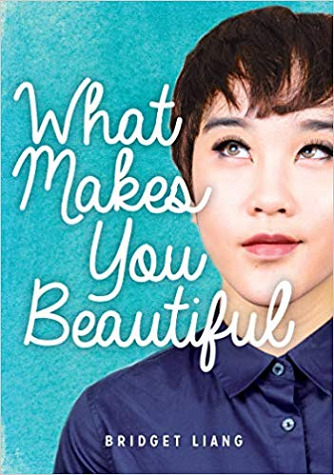
[image description: cover of What Makes You Beautiful by Bridget Liang. Off-center portrait of an east Asian teen wearing a blue button-up shirt, eye makeup, and lipstick.]
Note: like last month, this is book in which the POV character realizes they are trans over the course of the story. While the character is “Logan” for the first part of the story, she begins using the name Veronica in the final act. Midway through, while still working out her gender, Veronica asks her friends to use they/them pronouns for her. The story doesn’t have a moment in which she updates her pronouns, but I’ve made the assumption that she would ultimately go with she/her by the book’s end.
Veronica will never be the perfect half-Chinese son, but her mother and father are in denial. Despite her parents’ misgivings, Veronica switches to an arts high school to pursue singing. She quickly makes friends with several queer kids at the school. With new freedom to explore her identity, she slowly begins to realize that while she likes guys, she herself is not a guy.
What Makes You Beautiful is a really quick read. It’s short in length, with a straight-forward plot that pulls the reader along. While there are some darker moments (particularly instances of racism, homophobia, and so on), it’s by and large a sweet book -- and even downright cheesy at times. If you’re looking for a pleasant read to pass an afternoon or a flight, What Makes You Beautiful fits the bill.
There is a lot packed into this little book though, despite its brevity. The cast is highly diverse in terms of sexuality, gender, ethnicity, religion, and more. With so many different identities in play, the author gets to explore a lot of different topics naturally in the story.
For example, Veronica has doubts about being a trans girl because she fears she’s falling into the stereotype of Asian men being submissive. Veronica and her friends come into conflict with their voice teacher because all the winter concert songs are Christmas songs. One of her friends discloses that it was difficult to get his gender identity respected because of his autism. And so on and so forth. These many intersections of identity reflect the complexities of the real world and make What Makes You Beautiful stand out from similar trans coming out narratives.
There are moments, however, that might come across as over the top and strain readers’ suspension of belief. For instance, when Veronica’s father drops her off at school on the second day, he sees her visibly queer friends waiting for her and shouts at them, “Kids like you are ruining this great country!” It’s a really erratic burst of violent homophobia from someone who is otherwise portrayed as more your run-of-the-mill “I’m not bigoted!” casual bigot.
My belief was also strained by how quickly the character relationships developed. Veronica is pretty much folded into an existing friend group her very first day of school, in addition to making friends outside the group.
It’s true that friendships generally move faster with kids than adults, but I couldn’t help but raise a skeptical eyebrow when Veronica thought “I feel safe nestled between these two boys” and earnestly saying “I never had friends like you two before” within 24 hours of meeting them. Arguably, Veronica is starved for friendship since it seems she didn’t have any at her previous school. But since she was bullied, I’d expect her to be more wary.
I appreciated how well the love interest was handled. Kyle hangs around with the queer kids but is straight himself. He initially isn’t especially romantically or sexually attracted to Veronica. However, as her true gender becomes more apparent and she begins experimenting with presentation, his feelings spark. Later, he’s frank with her that this made him question his sexuality, but it doesn’t come across as an “Oh, god, am I gay??????” panic. It’s also refreshing that the guy who is indisputably the hottest in the book is Asian, since Asian men in media are so often classed as less than sexually desirable.
Reading What Makes You Beautiful was kind of nostalgic to me. I also attended an arts high school, so I remember the unique energy of being surrounded by people who are all into the same craft as you. My high school also had a reputation as the “gay school,” though students weren’t nearly as openly queer -- and the teachers weren’t nearly as queer-friendly -- as at Veronica’s school. Perhaps though my school today is more like Veronica’s than the school I remember; a lot has changed in the last decade.
To wrap up, I recommend What Makes You Beautiful if you are looking for a trans coming out narrative where the main character has a really supportive friend group (as well as the mentorship of a trans adult.) If you relate to the “It was obvious to other people, but I didn’t notice until it was pointed out” sort of trans experience, you’ll likely find a lot to relate to here.
And, of course, there is always a need for more racially diverse trans books -- What Makes You Beautiful is a very welcome addition. If you’re looking for more QPOC YA books similar to this one, I’d personally recommend Let’s Talk About Love by Claire Kann (female Black asexual main character, male Asian straight love interest) and This Is Kind of an Epic Love Story by Kheryn Callender (male Black bisexual main character, male Latino gay hard of hearing love interest).
0 notes